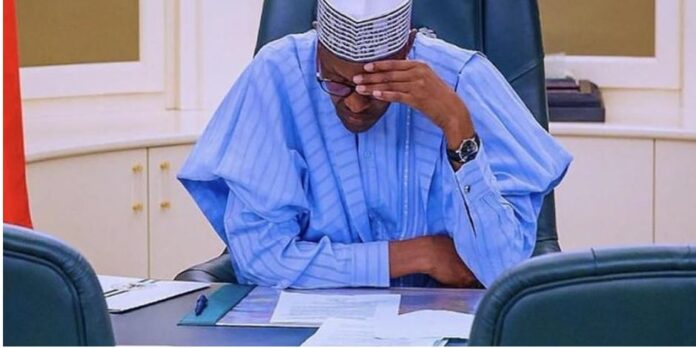Buhari now spends more to service debt amid low revenue
By Jeph Ajobaju, Chief Copy Editor
Nigeria’s debt service-to-revenue ratio rose from 81.1 per cent in 2020 to 96 per cent in 2021 but revenue increased only 9.3 per cent to N4.39 trillion year-on-year (YoY).
A total N4.22 trillion was spent on debt servicing in 2021, hiking 29.3 per cent above N3.27 trillion in 2020, according to figures from the Central Bank of Nigeria (CBN).
Debt service obligation grows on consistent borrowing by President Muhammadu Buhari to fund budget deficits.
Data compiled by the Debt Management Office (DMO) shows that Nigeria’s debt reached a record N39.56 trillion ($95.78 billion) in 2021, an increase of N6.64 trillion ($9.39 billion) on N32.92 trillion ($86.39 billion) in 2020.
Meanwhile, treasury revenue is hampered by decline in oil production at home and volatile oil price on the international market.
Daily crude oil out dropped to 1.6 million barrels per day (mbpd) in 2021 from 1.78 mpbd in 2020, according to National Bureau of Statistics (NBS) data.
Figures from the Organisation of Petroleum Exporting Countries (OPEC) show that Nigeria’s crude oil production declined to 1.238 mbpd in March 2022 from an average 1.258 mbpd in February 2022.
Despite increase in Value Added Tax (VAT) rate from 5 per cent to 7.5 per cent, non-oil revenue has not filled the gap caused by low oil earnings.
__________________________________________________________________
Related articles:
Lawyers petition ICC to file charges against Buhari
Buhari as mini antiChrist wasting Nigeria
Oil money losses can fund Buhari’s projects without loans
Abuja blames high debt on firms dodging N7tr tax payment
Buhari ignores yearly $4b oil theft, insists on taking loans
__________________________________________________________________
Breakdown of debt
Below is a breakdown of Nigeria’s debt disclosed in official figures, according to reporting by Nairametrics.
- Domestic debt increased by $4.54 billion to $46.59 billion in 2021. External debt rose by $5.04 billion to $38.39 billion.
- FGN bonds worth N13.96 trillion accounted for 72.6 per cent of domestic debt, followed by Nigerian Treasury Bills (N3.79 trillion), and promissory notes (N762.54 billion).
- Up to 48.6 per cent of external debt is owed to multilateral bodies – the International Monetary Fund ($3.46 billion), Internal Development Association of the World Bank ($11.97 billion), African Development Bank ($1.55 billion), among other sources.
- Countries owed bilateral debts include Exim Bank of China ($3.63 billion), France ($561.6 million), Japan ($71.79 million), Germany ($164.27 million), and Exim Bank of India ($33.48 million).
Debt servicing trends
- Nigeria spent N13.75 trillion on debt servicing in the five years between 2017 and 2021, about three times the cost in the preceding five years between 2012 and 2016 (N4.89 trillion).
- Debt servicing cost between 2017 and 2021 was more than 19 per cent of Gross Domestic Product (GDP).
- Total debt more than doubled to $95.78 billion (N39.56 trillion) in the space of 10 years between 2012 and 2021.
- Debt service-to-revenue ratio rocketed from 21.6 per cent to 96 per cent between 2012 and 2021.
- A total N3.61 trillion is earmarked for debt servicing in the 2022 budget, representing 21 per cent of total expenditure.
Nigeria is spending almost all of its revenue on servicing debts, exposing its financial stability to rising interest rates.
As global interest rates rise, it will become more expensive for the government to fund its budget. The need will then arise to trim expenditure or find ways to increase revenue.












